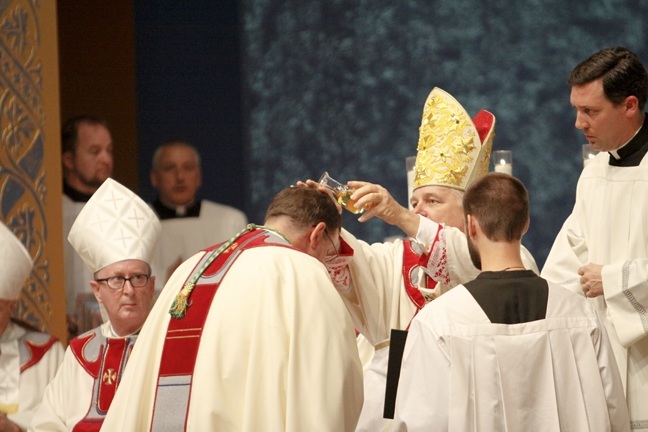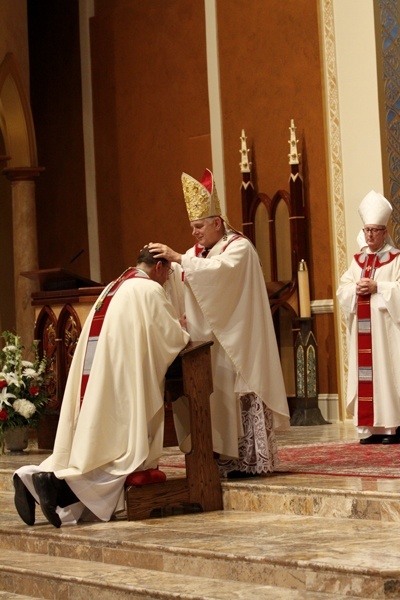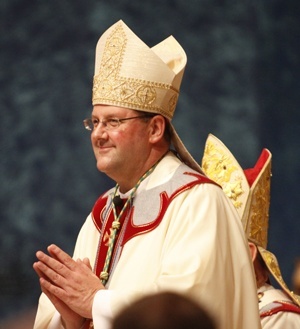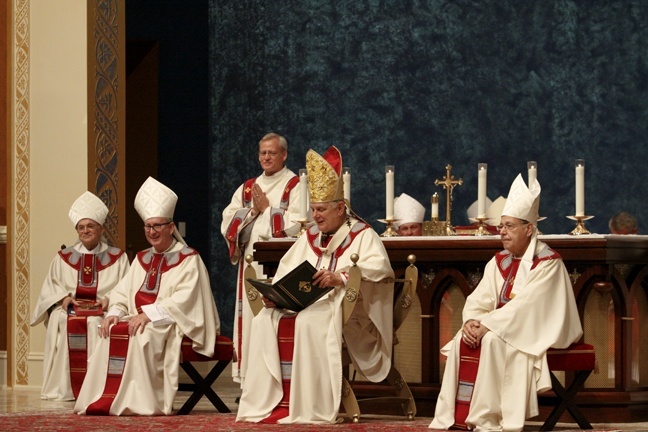By Archbishop Thomas Wenski - The Archdiocese of Miami

Photographer: COURTESY PHOTO | Sister Elizabeth Worley
Archbishop Thomas Wenski consecrates Bishop Gregory Parkes by anointing him with the oil of chrism. At left is Bishop John Noonan of Orlando.
Today this local Church of Pensacola-Tallahasse will witness the episcopal ordination of its new chief shepherd and "high" priest. St. Augustine reminds us that the title bishop is not one of honor but of service. As Bishop Parkes assumes the duties of a bishop serving the people of Florida's Panhandle, I think I can assure you that � with God's grace and your support and prayers � he will not be "in over his head."

Photographer: COURTESY PHOTO | Sister Elizabeth Worley
Archbishop Thomas Wenski lays hands on Bishop Gregory Parkes, during the rite of ordination of a bishop.
Also, a special welcome to the bishops who will join me in the laying of hands through which Bishop-elect Parkes becomes a successor of the apostles and a member of the College of Bishops. Joining us and representing the Holy Father is the Apostolic Nuncio, Archbishop (Carlo Maria) Vigano. Archbishop Vigano, the clergy and the people of Pensacola-Tallahassee thank Pope Benedict for this early "Father's Day" gift. And, of course, we are joyful to see with us today our Bishop Emeritus, the Most Rev. John Ricard. Thank you for your years of service to the people of the Panhandle: You can take some holy pride in your stewardship of this diocese; and your work here for the Church of Pensacola-Tallahassee has borne much good fruit, not the least of which is a goodly number of priestly vocations.

Photographer: COURTESY PHOTO | Sister Elizabeth Worley
Bishop Gregory Parkes prepares to give his "thank yous" after being ordained a bishop.
We see signs of this loss of hope all around us. We see it in some people's seemingly insatiable appetite for illegal drugs, fleeting pleasures or elusive riches. Without hope, people do not make any enduring or lasting commitments to the future � by responding to the call of a religious or priestly vocation or to the call of a project called marriage and a family. As seen in the attempts to suppress religious freedom, a society which exiles God by reducing religion to the "private" and belief to merely subjective opinion expels hope from its midst. That our post-modern world has lost hope perhaps explains why a politician can take the word hope and make it a campaign slogan.
Yet, as Pope Benedict XVI warns us, "A world without God is a world without hope; a world without God is a world without a future." (Spe Salvi) A bishop, through his triple "munera" of teaching, sanctifying and governing, is to be a "prophet, witness and servant" of that hope that will never disappoint, the hope that has a human face: Jesus Christ. Through the preaching of the Gospel, through the celebration of the sacred liturgy, through works of charity, under the leadership and oversight of their pastor, the Christian community shows the world that God does matter � and in doing so offers the world in Christ a future of hope.
A servant of Jesus Christ for the hope of the world, the bishop must therefore be filled with the courage of humility � not asking what prevailing opinion says about him but following the criterion of God's truth and taking his stand accordingly � whether opportune or not. Such a bishop was St. Boniface, the bishop and martyr, whose feast day the Church commemorates today. Like Boniface, who cut down the donar oak held sacred by the pagans whose souls he sought to win for Christ, a bishop seeks to "discern wherever he exercises his ministry, the signs of life which are able to uproot the seeds of destruction and death. Hope sustains him as he transforms conflicts themselves into an opportunity for growth and for reconciliation." (Pastores Gregis)
My brother, Gregory, the liturgical of episcopal ordination interprets the essential features of a bishop's ministry in the questions which I will shortly pose to you. "Do you resolve...?" I will ask you eight times. Each question solicits from you a statement of your intention � your willingness to undertake what is being asked of you; and each question points out a path for you to follow in the exercise of your episcopal ministry: And what is asked of you? What are those paths to be followed? You are asked to preach the Gospel of Jesus Christ; to go ahead of and lead God's people; you are asked to teach the sacred heritage of our past; to defend and promote the doctrinal unity of the faithful; to show mercy and charity to the needy and the poor; you are asked to pray without ceasing. These questions set before you a road map, or itinerary, to be followed in the exercise of your episcopal office.
My dear people, the call to the order of the episcopate is a complete abandonment to the mystery of the cross � to the mystery of love. It is a dying to self. For this reason, the beautiful worship aid in your hands is adorned with various representations of the "tree of life." To cite St. Augustine again, with you he is a Christian but for you he is a Bishop. Respect him, love him, and pray for him that his ministry as bishop among you will be fruitful.
Acting as father, brother and friend to all, Bishop Gregory Parkes will stand beside everyone as the living image of Christ, our hope, in whom all God's promises and all our expectations are fulfilled. Gregory, as a bishop, you must shepherd the flock entrusted to your care so that they and you will readily give to the world the reasons for your hope (cf. Peter).

Photographer: COURTESY PHOTO | Sister Elizabeth Worley
Archbishop Thomas Wenski delivers the homily during the Mass of ordination and installation for Bishop Gregory Parkes at St. Paul Church in Pensacola. Bishop Parkes, a priest of the Diocese of Orlando, is the fifth bishop of Pensacola-Tallahassee. Surrounding the archbishop, from left: Archbishop Carlo Maria Vigano, papal nuncio to the U.S.; Bishop John Noonan of Orlando; and Bishop Felipe Estevez of St. Augustine.


Comments from readers